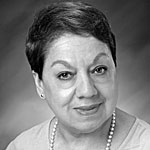Statement from Bea Fantini
January 8th, 2018 | SIT Graduate Institute

As many of you know, Alvino and I have spent most of our professional lives at SIT. Alvino was one of the creators of SIT and one of the founders of the MA in teaching (MAT) program. We both were MAT faculty from the first program on, and we’ve both taught for all SIT programs. SIT means a lot to us, personally and professionally.
When programs began at SIT, they were all innovative, groundbreaking – almost revolutionary. They were based on the founding principle of The Experiment summer programs – field experience – and they all required an internship overseas.
First was the International Career Training program (ICT) later known as PIM (Program in Intercultural Management). The idea of training people to work internationally was novel. While the Peace Corps was training people for volunteer work overseas, we had a program to train professionals to work overseas. At the same time, we were training people for the Peace Corps.
A year later, we started the MAT program. There was a need to train foreign language teachers to teach in creative, communicative ways and not solely via language grammar. Our first program was for French and Spanish teachers. Because of the success of these programs, we designed the World Issues program for college juniors who were interested in working on environmental, population, and ecology issues. Again, this program was unique, and we were doing something very different.
However, other academic institutions also realized that there was a need to train people beyond the traditional arts and sciences. The world needed people with practical skills who could help solve global and regional problems. Over time, SIT’s programs needed to change. The MA in Teaching added English (ESL). The ICT not only changed its name to PIM, but added peace studies, peace and conflict resolution, sustainable development and, later, international education.
While we were still engaged in overseas programs through summer abroad and study abroad, graduate program alumni were working all over the world, including the United States. What happened next was natural – the more other universities offered similar programs, the more we needed to diversify ours. This was not easy; new things come at a high price. We closed the World Issues program, and later we limited the MAT program to ESL only. At the time, all institutions of higher learning were suffering from low enrollment. Even though we had to make changes, we survived.
The recent and most dramatic change at SIT, to create global degree programs in many sites around the world, is not new. Former President James Cramer spoke of this possibility and saw its potential. At the time, one such program was established: the Japan MAT.
Given our history and presence overseas, it is only logical to think about conducting programs in places where SIT already has a presence. Everything has its time and place. Rather than lamenting the transition, we have to support it. The alternative is unthinkable.
I am a product of education abroad. Its rewards are immeasurable. Multicultural education, multilingualism, and field-based education are all extremely valuable and important in a globalized world. We have always had these kinds of students in our programs and we hope we will continue to attract exceptional individuals to these new formats.
As one of the founding faculty members of SIT and an SIT alumna, I am confident that this new approach will be as successful as SIT as a whole has been since it first began more than 50 years ago.
